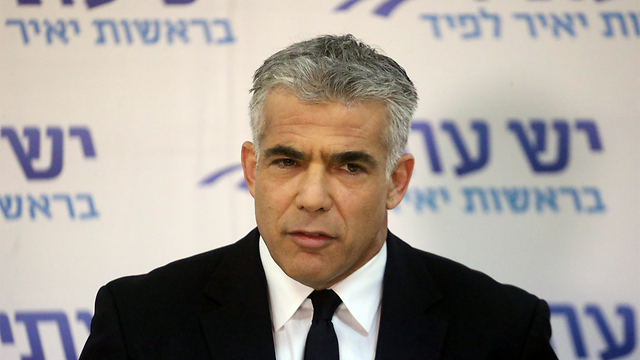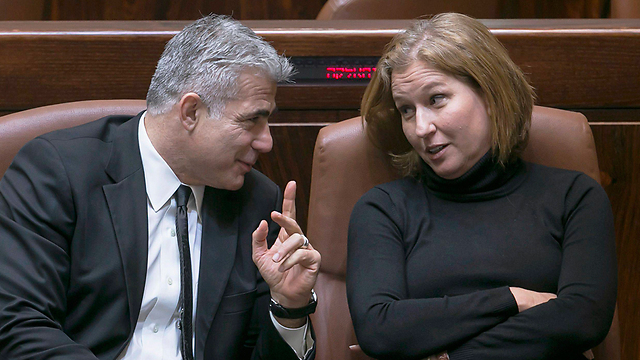
It's not the manifesto; it's the man
Op-ed: If Netanyahu is as bad as Lapid and Livni claim, then why were they in his government for so long? And who is whispering tales of unlikely plots in the prime minister's ear, and why did he believe it?
1. The letter on the wall
Yair Lapid received the phone call from Benjamin Netanyahu while sitting at a café with his daughter, Yael – as he does every Tuesday afternoon.
Lapid had just ordered an espresso when the phone rang. Netanyahu was on the line. It was a brief and unpleasant conversation.
Netanyahu told Lapid he was firing him in light of his behavior and the manner in which he has criticized him. Prime Minister, Lapid responded, we're adults; if you want to fire me, fire me. Don't look for excuses.
The waitress showed up with the espresso just as the call ended. You know, Lapid said to her, when I ordered the espresso, I was still the finance minister.
What do you mean, the waitress asked in surprise.
Between the time I ordered the espresso and the time you brought it to me, Lapid said to her, I was fired.
So if anyone wants to know who the first person was to hear of the finance minister's dismissal, it was the waitress with the espresso.
As far as the prime minister's press conference goes, Lapid watched that in the basement of his home, along with the Yesh Atid ministers. Within minutes, the basement turned into a war room. You know that according to the law, you should now be the leader of the opposition, said one of the ministers.

Are you crazy, Lapid responded; Buji (Isaac Herzog) has been carrying that role on his back for almost two years. I'm not going to take it away from him. The first call the dismissed finance minister made was to Herzog. He informed him he had no intentions of assuming the role of leader of the opposition.
Lapid received the official letter of dismissal the following the day. He framed and hung it in his study, where it will remain in eyeshot over the coming months, as Lapid busies himself with his first and primary task – to convince the public that Netanyahu will not be the one to form the next government.
He kicked off his mission already on Wednesday, at the press conference he held in response to Netanyahu's from the day before.
You're out of touch, he said to Netanyahu, and we now have the campaign slogan for Yesh Atid, if not for the entire center bloc: "Bibi, you're out of touch."
Lapid's list of the prime minister's damaging actions made Netanyahu's grocery list from the day before seem like the diary of an adolescent boy. The things expressed by Lapid – a senior minister in the Netanyahu government who claims to be in the know, someone who was at Netanyahu's side for the last 18 months – were frightening; and they certainly justify the question: What were he and Tzipi Livni doing there until now?
If this was how the prime minister had behaved, and if this was their attitude towards him, why did they wait for him to fire them? Every ingredient on Lapid's list warrants a commission of inquiry and should keep us awake at night – if these damaging actions are indeed taking place in the country's most important bureau and the most prestigious and confidential forums.
Already apparent is the fact that the upcoming election campaign will be more about the man than about the manifesto. The man's name is Benjamin Netanyahu, and apparently the consensus among the rival parties with which they will go to the polls is their loathing for him.
Lapid rejects Netanyahu's accusation concerning an attempted putsch – the move that prompted the prime minister to fire his two ministers and go to the polls. There was no putsch, Lapid said, addressing the prime minister personally.
If Netanyahu had been standing at his side, Lapid probably would have asked him to look him in the eye. I tried to orchestrate a putsch against you, he asked. Can you hear yourself? Who sold you that nonsense?
I wonder who really did sell the story to Netanyahu. It's probably the million-dollar question that's currently doing the rounds among the political establishment. Who told Netanyahu that Lapid, or persons on his behalf, had approached the ultra-Orthodox with a proposition to form an alternative government?
The possibility that someone thought that Aryeh Deri and Yaakov Weitzman would crown Lapid as prime minister is so ridiculous that it's truly hard to understand just how Netanyahu swallowed it.
And since there is no evidence in the field of such an attempt being made, we are left only with the testimony of the ultra-Orthodox party leaders that Lapid tried to coax them into forming an alternative government.
I suggest that each and every one of us takes the time to think about who to believe. Perhaps we'll get the answer after the election, when the alliance between the ultra-Orthodox and Netanyahu – an alliance they adamantly deny – is revealed. Then we'll be able to know who we should truly believe.
Nevertheless, I asked the Likud's Ze'ev Elkin this week why they're so sure there was an attempted putsch on the part of Lapid and Livni.
Three Knesset party leaders confirmed it to me, Elkin said.
Who, I asked, Shas, Degel HaTorah and United Torah Judaism?
Yes, Elkin replied; they told me the issue had been discussed with them. And there was a fourth party leader, whose name I won't mention, who was also approached but refused to meet with them.
And you, I asked, opted to believe Deri, Litzman and Moshe Gafni, who are clearly interested in seeing the government fall, who desire elections with all their might, rather than Lapid and Livni?
When you're driving down the road and it seems like everyone coming towards you is traveling against the traffic, Elkin said, you have to ask yourself if you're traveling going in the right direction.
2. The revolt against the father
But the possibility that Netanyahu won't be the one to form the next government is still a distant one. So many things still have to happen for there to be a center bloc strong enough to oust Netanyahu, so many elements need to come together, so many urges need to be restrained – that it seems almost impossible.
Lapid himself failed on Wednesday to respond to a question about joining another Netanyahu-led government after the elections. He forcefully reiterated that Netanyahu wouldn't be forming the next government. It's a shame; a more clear-cut statement was in order, one that better suits his and the other center parties' mantra – "Anyone but Bibi."
For his part, former minister Amir Peretz continues to adhere to this mantra, and he welcomed the break-up of the government this week. We'll make every effort to try to unite all the center parties, he said. Livni, he added, was ready to be part of such a bloc.
And allow someone else to lead it, I asked.
Knowing, he said, that the chances of the others leading it are greater.
The first to declare this week that he's in was Shaul Mofaz. I'll join the center and sane bloc and place my security experience at the disposal of whoever is elected, Mofaz said. That Naftali Bennett has to be reined in. I wouldn't want him to be the next defense minister of the State of Israel.
On Tuesday, Mofaz said, Netanyahu stood up at his press conference and listed all the reasons why he is going to the polls. None of these arguments carry any weight for the average voter. What's it all about – about the fact that Netanyahu thinks they tried to overthrow him? And he didn't approach me and the ultra-Orthodox and ask us to come into his government so that he could ditch Lapid and Livni?
Mofaz tells of two approaches from Elkin. The first was to examine the option of getting rid of Lapid and Livni and replacing them with Mofaz and the ultra-Orthodox. Mofaz turned down the offer. The second time, he says, they came with an offer for me to join the Likud. I refused even to meet with them.
But the problem facing all those who see themselves as part of that center bloc aimed at deposing Netanyahu is neither Peretz nor Mofaz. The problem is Moshe Kahlon, who was thrown this week into the bubbling lava of the election campaign without actually being ready for it just yet.
It turns out that all those who have had talks with him, and that's just about everyone, are not totally convinced that he belongs to the "Anyone but Bibi" wing, and are concerned that when the day comes, he could veer right and join the right-wing bloc.
Kahlon's story, says a senior political source, is the same as Bennett's; it's a revolt against the father. It's not cast in stone that he will never again be part of a Netanyahu-led coalition. If Netanyahu calls on him after the elections, he'll come – just like he came when he was already out of the Likud and Netanyahu asked him to serve as be chairman of the Israel Land Authority.
Kahlon associates said in response that had he wanted to return to the Likud, he could have done so a long time ago. In any event, says the same political source, if Kahlon decides to team up with Lapid, together with Livni, they could emerge as the big winners from these elections.
It seems that everything these days is being viewed through the prism of the upcoming elections. On Wednesday, when the laws to bring forward the elections were presented in the Knesset plenum, Herzog stepped up to the podium. The Labor Party leader, who firmly believes he'll be the one to head the center bloc, delivered a fiery address against the government, as has been his custom of late.
During the address, Lapid and Livni could be seen sitting alongside one another whispering and giggling. One by one, the cameras abandoned Herzog and focused on the two. For anyone looking for signs, this was a clear indication that Livni intends to join Lapid and not Herzog – but not that I'd swear to it; when it comes to politics, what you see isn't always what you get.
3. The man on the shoulder
The Likud faction held a closed meeting on Wednesday. The mood in the room was one of uncertainty, gloom, listlessness. People are still in shock, confessed one of those in attendance; after all, some won't be back after the elections.
Most of the anger in the Likud is being directed at coalition chairman Elkin, the man who now sits on one of Netanyahu's shoulders, with Yisrael Katz occupying the other. The faction members are convinced that Elkin was the one to push Netanyahu into the move, and that had it not been for him, the government would still exist.
I know there are some people who are angry with me, Elkin says. I also know that ahead of the approaching primaries, the urge to self-destruct intensifies, and that there are people who instead of working to ensure the Likud's success in the elections, choose to busy themselves with back-stabbing and settling personal scores within the party.
Only someone who is not familiar with Netanyahu, Elkin claims, or someone who intentionally wants to harm him, can paint him as someone who can be dragged along or subjected to political manipulations. He has more experience in the political arena than any of us, and he's the one who makes the decisions, and certainly when it comes to such substantial matters like managing the relationship with the coalition partners.
Elkin admits that the prime minister consults with him frequently, but says he is not alone in this regard. When asked for his position on the dissolution of the government, he doesn't offer a direct response. My position is far more complex than it appears, he says. I thought that the best thing was to try to restore order to the relationship with the partners and for them to realize that they cannot continue their politics of threats and blackmail and coercion of their positions.
In the end, when they chose not to follow that path, the prime minister was left with the choice of either maintaining the status quo without the ability to run the country, or disbanding the government.
I told the prime minister, Elkin says, that it's a tough decision, because elections come with a big risk. On the other hand, he could remain prime minister for another year or two, if he were to accept a situation in which he has no true influence over the important issues on the agenda. My job was to ensure that if we were to find ourselves in a coalition crisis, we would not be surprised by the establishment of an alternative government headed by Lapid and Herzog.
Well, with such advice, I said, no wonder Netanyahu chose elections. So you're the one who stirred all the demons inside him, who sparked the putsch paranoia.
It didn't come from me, Elkin replied.















